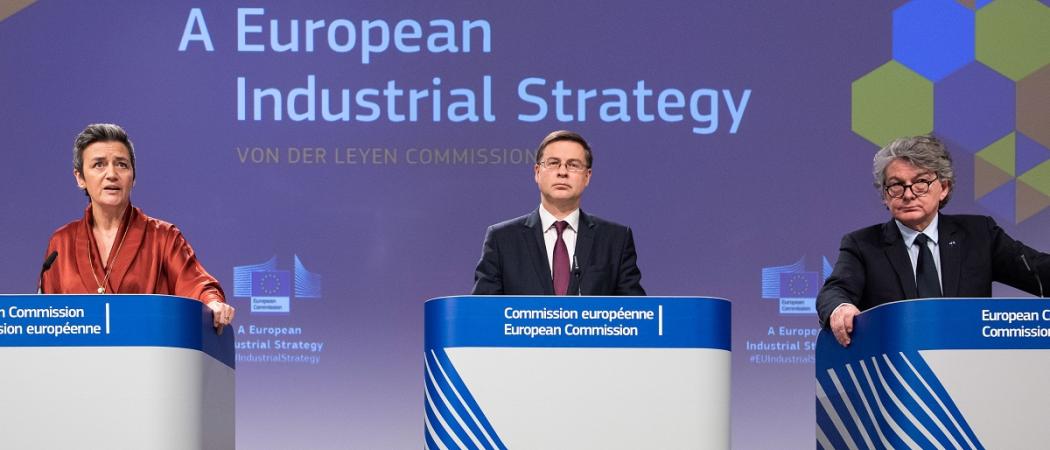Commission pledges to give new impetus to development of clean hydrogen fuel technologies and stimulate investment in companies run by women

EU Commission's executive vice presidents Margrethe Vestager and Valdis Dombrovskis and Thierry Breton, EU commissioner for internal market. Photo: European Commission
Clean hydrogen technology is identified as a prime candidate for additional public investment in a new EU industrial strategy published this week.
With competition pressing in from Silicon Valley, and from China's gigantic investments in industrial projects, Ursula von der Leyen’s European Commission announced a raft of R&D initiatives on Tuesday to bolster Europe’s green and digital ambitions.
The industrial strategy, trailed for some months through various leaks, proposes to bring member states and industry together for big, pan-EU industrial projects – so-called Important Projects of Common European Interest, which would get a special exemption from competition rules to create Airbus-like consortia developing new products and services.
Among the areas proposed as suitable for such a project is the production of clean hydrogen as an alternative to using fossil fuels for heating and transport, in particular.
The commission will build a public private alliance to develop the technology, modelled on the multi-billion-euro advanced battery alliance, involving seven EU countries and 17 companies.
Current production methods mean clean hydrogen is prohibitively expensive, but EU officials say it could become vital for energy-heavy sectors such as aviation and transport, as Europe pushes towards carbon neutrality.
Other alliances to come in the future will include low-carbon industries, cloud computing and industry access to raw materials, the commission says.
Brussels also pledged at least €300 million for breakthrough green technologies under the European Innovation Council, which will launch fully next year, to give impetus to the commission’s Green Deal plan.
There will also be targeted funding for companies run by women under the InvestEU umbrella fund, and a public private fund dedicated to investing in initial public offerings of small companies.
The commission says it will also review its competition rules and act against foreign subsidies, to help European companies to compete globally against US tech giants and government-aided Chinese rivals.
Making competition rules flexible to support European giants of a scale that can compete globally is a key demand of Germany and France. Their push for a change in rules follows the EU’s decision last year to veto the merger of Siemens and Alstom’s rail industry businesses.





 A unique international forum for public research organisations and companies to connect their external engagement with strategic interests around their R&D system.
A unique international forum for public research organisations and companies to connect their external engagement with strategic interests around their R&D system.